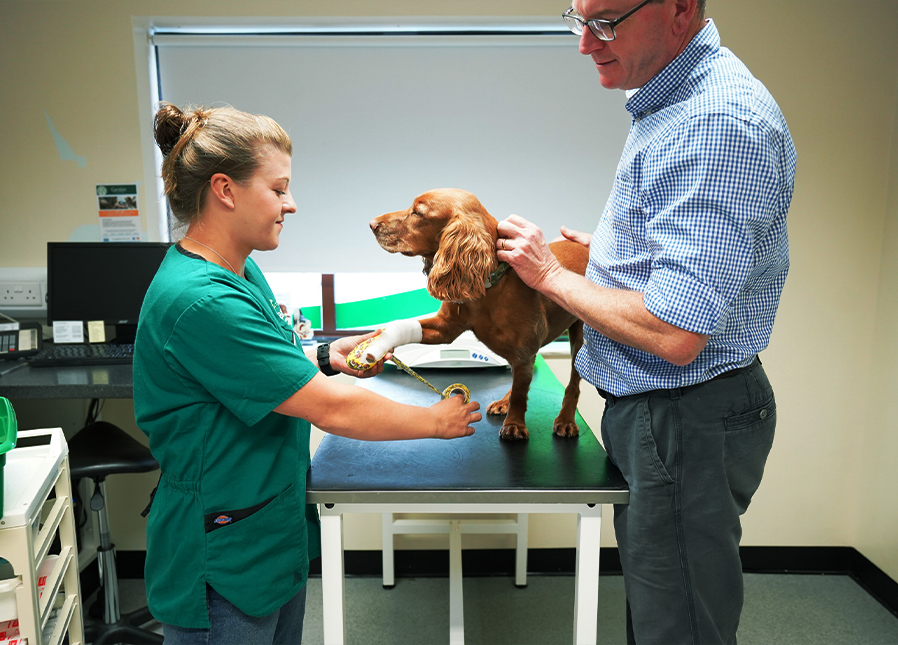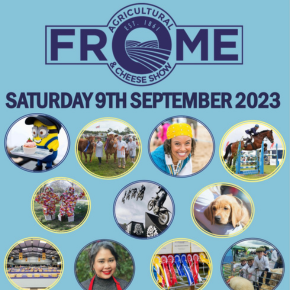
We are back at Frome Agricultural & Cheese Show for our 17th year. As always, our trade stand is situated opposite the dog show ring, you honestly can’t miss us!
Our tea and cake bar has become a firm favourite with show visitors and this year you can choose from raspberry & white chocolate muffins, fruit and nut flapjack, bread pudding and gingerbread biscuits to accompany your hot drink. Why not try our popular Garston travel mug deal and enjoy unlimited refills of tea, coffee or orange juice all day?
We also have a great selection of pet merchandise to purchase, along with our NEW harvest festival themed dog shop and tombola.
Fresh water and treats are available all day for our four-legged visitors, plus there’s always a vet on call should you need us in an emergency.
The Garston Dog Ring schedule will keep the crowds entertained all day, with lots of demonstrations and fun show classes from 9.30am – 5pm thanks to Charismatic Pets and M&M Gundogs.
Dog show class registrations start at 9am at our trade stand on show day. Each entry is £3.00, and every entrant receives a rosette with a prize for 1st place.
9.30-10.30am: Come and meet the behaviourist.
Come along and ask the behaviourist any questions you have relating to dog behaviour.
10.30-11am: Scent work demonstration
Pet dogs can do scent work too. Come and watch a searching demo to see how it’s done.
11-11.30am: M & M Gundog scurry demonstration
Watch Martin’s dogs find and retrieve a dummy in record time.
11.30-12pm: Most charismatic puppy (under 1 year)
Enter your gorgeous puppies. Any breed welcome must be under 1 year of age.
12-12.30pm: Most handsome gentleman (over 1 year)
Enter your handsome lads. Any age and breed welcome.
12.30-1pm: Prettiest lady (over 1 year)
Enter your prettiest girls. Any age and breed welcome.
1-1.30pm: ‘Have a go’ Hoopers and demonstration
Watch how Hoopers works with our demo and then have a go yourselves on a Hoopers course. Any age and breed welcome.
1.30-2pm: Dog Parkour demonstration
Feet on, feet in, unders, throughs and more. Come and see our parkour pups having fun!
2-2.30pm: M & M Gundog scurry demonstration
Watch Martin’s dogs find and retrieve a dummy in record time.
2.30-3pm: Most charismatic puppy (under 1 year)
Enter your gorgeous puppies. Any breed welcome must be under 1 year of age.
3-3.30pm: Most handsome gentleman (over 1 year)
Enter your handsome lads. Any age and breed welcome.
3.30-4pm: Prettiest lady (over 1 year)
Enter your prettiest girls. Any age and breed welcome.
4-5pm: ‘Have a go’ lure chase
Let your pooch have a go at chasing the lure around the luring course. The faster the better! Must be over 1 year. All breeds welcome.
All money raised will be donated to Move the Mind
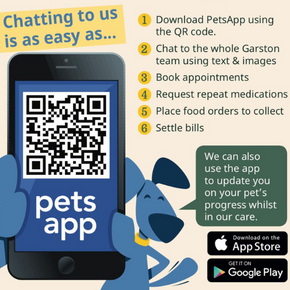
Chatting to our small animal team, booking appointments, requesting repeat medication and food orders, plus settling bills and keeping up to date with your pet’s progress while staying with us has just got a great deal easier.
PetsApp is our new online service that is keeping our phone lines free for more urgent calls. If you haven’t downloaded PetsApp already, you can do so:
By responding to our SMS invitations,
or
By clicking on the magic link https://petsapp.com/ml/ubgjLa2c2n9i3BEi9, selecting your usual Garston surgery, and creating your pet’s profile,
or
By using the PetsApp chat tab on our website in the bottom right-hand corner of our homepage.
Once you have a PetsApp account the whole family can use the same log-in to contact us about your pet.
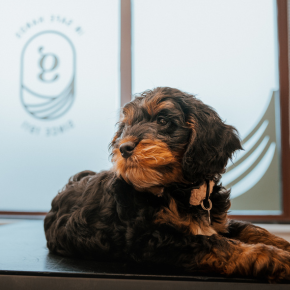
The school holidays are here and for many of you, that may mean having a new furry friend joining your family! If you do plan on investing in a puppy or kitten this summer, read our short guide below on why this is an ideal time and how best to prepare for this exciting change.
Remember to contact our team to register your new pet and book their vaccinations, weigh-in & parasite prevention appointments, or you can start this process on our website – register your pet online
We also have a helpful guide on what to look out for when buying a new puppy or kitten – download it here.
Tips for purchasing a new Puppy or Kitten
Why the school summer holidays are ideal
We typically see an uplift in new puppy and kitten registrations during July and August – good reasons for this include:
- You may have an extended period of time at home (depending on your profession and family setup) meaning you’ll have more time to properly care for, train, and socialise a young pet. Remember to ensure they get used to spending time alone though to reduce separation issues down the line.
- If you have children, they can be more involved with the early stages of your new pet’s development and acclimation to your home during the 6-week school summer holidays – the perfect time to teach them about pet care responsibilities!
How to prepare your home for a new pet
1. Pet-proof your home
Puppies and kittens are curious and love to explore their environment, so it’s important to make your home safe for them. This may include removing any hazardous items, securing loose electrical cords, and ensuring that all cleaning chemicals and medications are safely locked away. You may also want to install a stair gate to ensure your puppy’s safety. It is wise to check your garden too for hazards, including poisonous plants as young pets like to explore with their mouths.
2. Purchase supplies
Before bringing your new pet home, make sure you have all the necessary supplies such as food & water bowls, a collar, lead, a pet crate, bedding, toys and food suitable for a puppy/kitten. Talk to the breeder and try to stick with the same brand of food they were feeding the litter to minimise the risk of tummy upsets. Stock up on puppy/kitten treats and register your new pet with us at Garston Vets.
3. Plan for toilet training
Toilet training is an important part of your new pet’s early training, so plan ahead for this. Decide on a designated area in your garden (or home for litter trays) and establish a consistent schedule for potty breaks. It’s also worth investing in puppy/kitten training pads to use in your house in case of accidents!
4. Make arrangements for your absence
Puppies and kittens require a lot of attention and care when they’re young. If you’re going to be away during the day, make arrangements for someone to take care of your pet or consider using a dog day care service for puppies or a pet sitter at your home. Our team at Garston Vets will be able to advise on local pet sitters/walkers in Wiltshire and Somerset for you.
5. Research training techniques
Start researching training techniques and consider enrolling your puppy in a regular training class. This will help to socialise your puppy and you will both learn basic obedience commands. You can actually train cats to respond to some commands too!
6. Prepare your family
Getting a new pet is an exciting time, but it’s important to prepare your family, especially children, for the responsibilities that come with owning one. Teach them about the importance of gentle handling, proper feeding and exercise, and encourage them to be part of your pet’s daily care. By following these tips, you’ll be well-prepared to welcome your new furry friend into your home during the school holidays. Remember, patience and consistency are key to successful ownership and don’t forget to register your pet with Garston Veterinary Group.
7. Attend a Garston Puppy Clinic
Why not come along to one of our Puppy Clinics presented by Charis Vincent from Charismatic Pets Dog Behaviour & Training Centre, Warminster for advice on:
The sessions are open to both current and new clients, from pre-purchase to owners with puppies up to the age of 18 weeks.
Puppy Clinics are held at our Westbury Surgery on a Monday evening. Please ask at reception for the next available session.
Attendance is £10 per client or £5 if on a Garston Wellness Plan.
This event is for ‘hoomans’ only, but every attendee will receive a special goody bag to take home to their pup!
Download and share our guide on the do’s and don’ts of buying a new puppy or kitten this summer.
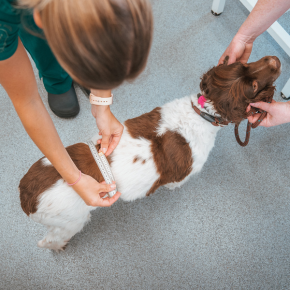
Obesity is one of the most common nutritional disorders in our pets today. Approximately 6 in 10 cats and dogs are overweight.
Just as in humans, weight gain most commonly occurs when there is an excess calorie intake that does not match the animal’s level of physical activity. Many things can contribute to weight gain including age, mobility, food type, and neuter status. It is important to recognise that although these factors increase the risk of weight gain, it is avoidable as long as we are aware of the presence of these risks.
What are the risks to my pet if they are overweight?
Animals who are overweight have a reduced life-expectancy and will have an increased risk of the following conditions:
- Arthritis
- Diabetes mellitus
- Heart disease
- High blood pressure
- Breathing difficulties and snoring
- Heat stress
- Pancreatitis
Many other significant conditions can be exacerbated by excess body weight, and animals that are overweight will have a significantly increased anaesthetic risk no matter what surgery they require.
How do I know if my pet is overweight?
Hopefully you will have already made you initial free weight clinic appointment with one of our nursing team. If you haven’t please do so as soon as possible. We have lots of experience with weight management are are here to give you as much advice and support as possible.
What can I do to prepare for the appointment?
- With the aid of our nurses we hope that you will soon start to see visible signs of weight loss in your pet. To do this we to start off on the correct foot. Please follow the next few steps so that your first appointment is effective as possible.
- Talk to all family members and other carers of your pet. You need to explain to them for health reasons your pet will begin a weight loss program. If everyone is on board at the start it should avoid frustration and confusion.
- Please complete a food diary for your pet for at least one week. Absolutely everything needs recording, from their normal daily meal, to every last table scrap or treat that they get given. Please be as honest as possible, as having a completely accurate record makes it easier for our Nurses to formulate a diet plan for your pet. Ensure you bring this with you to your appointment.
- Please either provide photos or bring your pet’s food packaging in with you to the appointment. Every food is formulated differently and the information on the back of the packet provides us with the nutritional information we need to devise a correct feed guide for your pet.
What happens at the initial consultation?
We do ask that you bring your pet along to all weight clinics.
During the free initial weight clinic:
- Your pet will be weighed and have various body measurements taken and recorded.
- The nurse will take several photographs of your dog for the records.
- The nurse will then spend time discussing your pet’s food diary and daily exercise regime with you.
- We will then discuss with you various options regarding diet and treats to allow us to tailor an individual and realistic diet and exercise plan for your pet.
- We will also provide your pet with their own weight management booklet to help support you through their weight loss experience.
At the end of the consultation our aim is to have helped you formulate a plan for your pets weight loss, diet changes, and exercise regime, we will also arrange an appointment for your pets next check.
We are offering 25% off all Royal Canin Weight Management Satiety diets in July, with a further 20% off for Wellness Plan members. Please click here or speak to a member of a team to find out more about our Weight Management Clinics and offers.
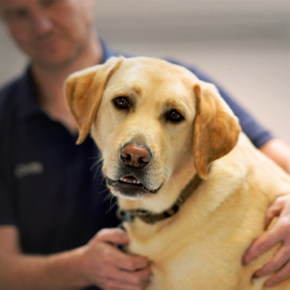
Spring is here, and for many of us, that means warmer Somerset & Wiltshire weather, blooming flowers, and spending more time outdoors with our furry companions. However, for dogs, spring can also mean the development or flare-up of allergies…
Dog allergy symptoms to be aware of
Did you know that dogs can be allergic to a variety of things just like humans, including tree and grass pollens, insect and flea bites, dust, and mould. These allergens can be particularly prevalent during the spring. Our veterinary team have put together a handy Dog Allergy Guide to help you get to know the symptoms of allergies to look out for.
Download our Dog Allergy Guide
Spring/summer environmental dog allergies [H3] Hay fever in dogs
Pollen allergies from trees, grass, flowers, and weeds can start in spring and last until autumn for some dogs. All dogs can suffer from pollen allergies (or hay fever) however, it seems to be more common in females and some breeds can be more prone to it, like Labrador Retrievers, Golden Retrievers, Dalmatians, and West Highland Terriers.
With airborne allergens, like pollen, dogs can have symptoms even when they’re nowhere near the source I.e., on the grass. Whereas some dogs may sneeze due to pollen allergies, there are many other more common symptoms to look out for – learn more here.
Mould allergies
Mould allergies can also affect dogs more when spring arrives, particularly in areas with high humidity; house mould should be dealt with as soon as possible.
Dust allergies
Dust allergies can lead to sneezing, breathing difficulties, and other common allergy symptoms
We’ve mentioned this as a ‘spring allergen’ as although it can occur at any time, ‘spring cleaning’ can disturb large amounts of dust and debris.
Flea bites
A whopping 95% of flea eggs, larvae and pupae live in the environment, not on pets. As the temperature warms up in spring, flea activity starts to ramp up. Some dogs are allergic to flea saliva and may have an immediate (within 15 minutes) or a delayed (24 – 48 hours) reaction that is most visible on the skin. If your dog has atopic dermatitis, they will be more prone to a flea saliva allergy.
Atopic dermatitis is a common condition that causes chronic itching, which leads to excessive scratching, biting or licking at the skin, resulting in inflammation of the skin and hair loss. This condition can be caused by an allergic reaction to environmental allergens, such as those above.
What to do if you think your dog is allergic?
If your dog is showing signs of allergies, it’s best to book an appointment with one of our vets. They can determine the cause of your dog’s symptoms and recommend an appropriate course of treatment. In some cases, they may recommend antihistamines or other medications to help control your dog’s symptoms. In more severe cases, they may also recommend an anti-allergy vaccination or topical medications to relieve the symptoms.
IMPORTANT: Never give your dog medication meant for humans, particularly antihistamines, without a vet’s explicit advice and dosage instructions. Some brands may contain harmful ingredients for pets and the dosage may not be the same as it is for humans. It’s also important to keep in mind that while spring is a common time for allergies to surface, dogs can develop allergies or have allergic reactions all year round.
Other reasons why your dog might be scratching
We think that it’s important to understand there may be other reasons for your dog’s scratching and irritation such as:
- Food intolerances
- Dry skin (from a lack of essential fatty acids in the diet, cold weather, or grooming products)
- Over-production of skin yeast or bacteria
- Skin infection
- Mites or lice
- A tick bite
- Behavioural issues such as anxiety or boredom
This is why knowing the other common symptoms of allergies and booking an allergy appointment for your dog is important. The sooner our team can investigate and diagnose, the sooner a treatment plan can be started and you dog’s daily life improved.

The Garston Vets’ Wellness Plans are designed to provide all your pet’s preventative healthcare needs for twelve months at a time. Each membership allows you to spread the cost of your pet’s annual preventative healthcare needs into twelve affordable monthly payments, as well as make further savings in other areas.
Our NEW Premium Wellness Plan includes UNLIMITED VETERINARY CONSULTATIONS and DISCOUNTED OUT OF HOURS FEES, giving dog and cat owners ultimate peace of mind.
All our Wellness Plans have been specifically designed so that your pet can receive bespoke preventative healthcare all year round with the cost to you spread over monthly payments. The plans incorporate annual vaccinations, anti-parasite medications, and a whole range of additional inclusions & savings to allow your pet to remain in tip-top shape.
Our team will work with you to ensure every aspect of your pet’s healthcare is appropriate and tailored to their age & lifestyle.
At Garston Vets we know our Wellness Plans provide exceptional cover as they also include tick prevention – an ever-increasing problem in rural areas. To budget with confidence whilst providing optimal veterinary care for your pet, sign up to our 12-month payment plan and start enjoying the many benefits right away.
Join or upgrade your existing Wellness Plan membership today!
Please note, our Wellness Plan options are not a pet insurance policy. We would recommend that you also consider insuring your pet against accident and illness.
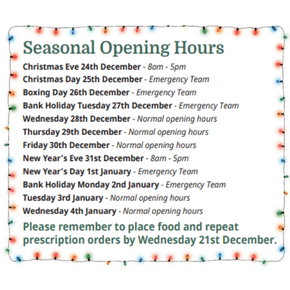
Seasonal surgery opening hoursChristmas Eve 24th December – 8am – 4pm Christmas Day 25th December – Emergency team Boxing Day 26th December – Emergency team Bank Holiday Tuesday 27th December – Emergency team Wednesday 28th December – Normal opening hours Thursday 29th December – Normal opening hours Friday 30th December – Normal opening hours New Year’s Eve 31st December – 8am – 4pm New Year’s Day 1st January – Emergency team Bank Holiday Monday 2nd January – Emergency team Tuesday 3rd January – Normal opening hours Wednesday 4th January – Normal opening hours Please remember to place food and repeat prescription orders by Wednesday 21st December 2022
Emergency CareAs a client of Garston Vets you can feel confident that we are always available to deal with any pet emergency that may arise, day or night, including Christmas Day, Boxing Day and New Year’s Day. We are one of the few practices in Somerset & Wiltshire that operate our own out of hours emergency service on-site at our accredited small animal hospital at Garston House in Frome. Our hospital is staffed 24 hours a day, 7 days a week, looking after sick and injured patients or those requiring post-operative observational care – your pets are never left alone. It is the same cohesive team of vets and nurses that look after your animals out-of-hours as you will meet during the day at any of our practices. Our computerised patient records from all our surgeries are securely linked via internet servers, so we have access to all your pets’ clinical records whatever time of the day. If you have a pet emergency, please call us on 01373 452225 |

Chatting to our small animal team, booking appointments, requesting repeat medication and food orders, plus settling bills and keeping up to date with your pet’s progress while staying with us has just got a great deal easier.
PetsApp is our new online service that is keeping our phone lines free for more urgent calls. If you haven’t downloaded PetsApp already, you can do so …
By responding to our SMS invitations,
or
By clicking on the magic link https://petsapp.com/ml/ubgjLa2c2n9i3BEi9, selecting your usual Garston surgery, and creating your pet’s profile,
or
By using the PetsApp chat tab on our website in the bottom right-hand corner of our homepage.
Once you have a PetsApp account the whole family can use the same log-in to contact us about your pet.
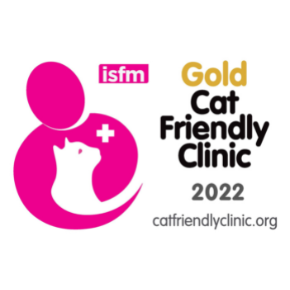
We have recently celebrated our further commitment to cat welfare by achieving the higher level of gold accreditation under the ISFM Cat Friendly Clinic accreditation programme at our small animal hospital in Frome.
Cat Friendly Clinic is a programme run by the International Society of Feline Medicine (the veterinary division of International Cat Care) to encourage veterinary clinics to adopt more ‘cat friendly’ approaches to reduce the stress and difficulties of veterinary visits for cats. It aims to promote well-being and high standards of care for all cats visiting or being hospitalised in a veterinary clinic. Under the programme, a clinic has to prove rigorous adherence to a set of criteria which includes provision of facilities and demonstration of staff activities and attitudes aimed at reducing stress in cats, both as in-patients and out-patients. The criteria includes having separate dog and cat waiting areas, feline-friendly hospitalisation cages, and veterinary equipment specifically for treating cats. Most importantly, staff are encouraged to approach and handle cats sensitively and respectfully. Clinics are expected to maintain high standards of veterinary care, including continuing to update their knowledge of feline medicine as new knowledge becomes available.
Natalie Gowen the clinic’s Cat Advocate is proud of the clinic’s further achievement: “Cat Friendly Clinic accreditation at this further level means we’ve committed to delivering even higher standards of feline care, with compassion and expertise. Our cat facilities are specifically geared towards the reduction of stress and all our staff are trained in gentle handling techniques. Our Frome surgery is currently undergoing major building work, to create more consulting rooms another operating theatre and separate cat and dog waiting areas. We can also give advice to owners on how to reduce anxiety when giving medication or treatments at home. Through our accreditation, we want to show cat owners that routine preventive care, and a prompt visit if their cat seems unwell, will help to give it a longer, healthier and happier life.”
Cat-friendly appointments
Most cats are very happy in our spacious waiting rooms, however, to support nervous cats we offer designated cat-friendly appointment times at all our surgeries, on the following days of the week:
- Frome Vets – Tuesdays
- Melksham Vets – Thursdays
- Trowbridge Vets – Wednesdays
- Warminster Vets – Wednesdays
- Westbury Vets – Thursdays
Our cat-only appointment times include veterinary consultations and nurse appointments, and keeping our waiting areas dog-free reduces potential stresses for cats and owners (Note: if we do have any dog emergency cases during these times, we will let you know on arrival). Visit our team page to see which staff members are specially trained Cat Advocates too!
Cat owners can find out more about International Cat Care and the Cat Friendly Clinic initiative at www.catfriendlyclinic.org.
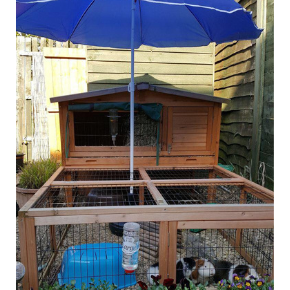
Even though they are small animals, the risk that hot temperatures pose to rabbits, guinea pigs, and hamsters is big. In fact, for most small pets, their ideal temperature range tops-out at 23-25°C and anything above can quickly become life-threatening. Some bunnies can tolerate temperatures as high as 30°C but it’s a risk not worth taking.
As rabbits, guinea pigs, and hamsters cannot sweat like humans do, and have limited options to cool themselves down, it’s up to their owners to help them survive summer heatwaves.
If you have questions after reading our article or concerns about your pet’s health, get in touch with our team.
Symptoms of heatstroke in small furry pets
If your rabbit, guinea pig, or hamster starts to exhibit any of the following symptoms of heatstroke you should get them somewhere cool and call us on 01373 452225 for emergency advice.
- Shallow, accelerated breathing (panting)
- Excessive drooling (thick saliva)
- Hot ears
- Wet nose
- Bright red or blue tongue and gums
- Less urine output due to dehydration
- Lethargy and weakness
- Confusion
- Convulsions
- Cardiac arrest
How to help small furries cope in summer
When the mercury is rising, there are some steps you should take to make sure your small furry pets stay safe. Our team of experienced vets have the following advice:
- Rabbits regulate their temperature through their ears so one way to boost their natural cooling system is to spray their ears with water – it will evaporate as it warms up. Avoid soaking your bunnies as this could put them at risk of respiratory illnesses.
- During hot weather, move their hutch or cage out of direct sunlight and into the coolest spot that is practical.
- Keep water bottles and bowls topped up and if there is access to power nearby, think about setting up a fan (not pointed directly at the cage) to keep the air moving.
- Make a ‘cold water bottle’ and wrap it in a cloth for your pets to lounge against or set up frozen water bottles around their housing.
- Place a cooling mat or pop some cold tiles in the cage or hutch for your pets to lie on.
- Rabbits and guinea pigs can be more prone to flystrike in warm weather so make sure your pets are clean and dry (check for urine stains) and keep their bedding and housing impeccably clean.
All these little tricks should ensure your small furry pets do not succumb to the heat. Remember, our vets are here to help if you are concerned about your pet’s health.


